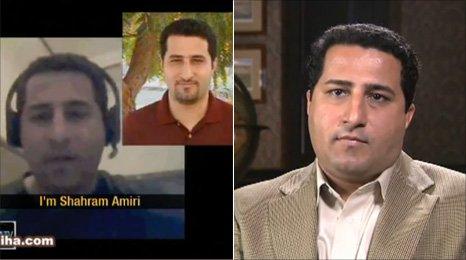Iran scientist Shahram Amiri free to leave, US insists
- Published

Three conflicting videos, purportedly of Mr Amiri, have emerged
The US insists that an Iranian nuclear scientist who has turned up in the country is there voluntarily and is free to leave.
The state department rejected claims by Tehran that Shahram Amiri, who surfaced at a Pakistani embassy building, had been abducted by US agents.
Mr Amiri vanished more than a year ago.
In June, three videos apparently showing him - and containing contradictory information on his whereabouts - emerged.
He said in the first that he had been kidnapped by US and Saudi agents, in the second that he was living freely in Arizona, and in the third that he had escaped from his captors.
On Monday evening, he arrived at the Iranian Interests Section of the Pakistani embassy in Washington, which handles Iranian affairs in the US capital.
Iranian media say Mr Amiri had worked as a researcher at a university in Tehran, but some reports say he worked for the country's atomic energy organisation and had in-depth knowledge of its controversial nuclear programme.
At the time of his disappearance, he was thought to be on a pilgrimage to Saudi Arabia.
US TV network ABC reported in March that he had defected and was helping the CIA by revealing valuable information about the Iranian nuclear programme.
But earlier this month, Tehran said it had proof that Mr Amiri was being held in the US.
'His alone'
State department spokesman PJ Crowley said: "He has been in the United States of his own free will and obviously he is free to go.
"In fact, he was scheduled to travel to Iran yesterday, but was unable to make all of the necessary arrangements to reach Iran through transit countries."
There are no direct flights from the US to Iran and the two countries have no diplomatic ties.
Mr Crowley added that Mr Amiri had informed American authorities that he wished to leave the US - which seems to confirm that American officials have been in touch with him.
Iranian Foreign Minister Manouchehr Mottaki told reporters at a news conference that Mr Amiri had been kidnapped during the Hajj pilgrimage to Mecca and taken to the US against his will.
He said Mr Amiri should be allowed to return home "without any obstacle".
US Secretary of State Hillary Clinton said Mr Amiri was free to go, and highlighted the case of three young Americans held by Iran since July 2009 and accused of illegally entering the country.
"These are decisions that are his alone to make," she said.
"In contrast, Iran continues to hold three young Americans against their will, and we reiterate our request that they be released and allowed to return to their families on a humanitarian basis."
Mrs Clinton also mentioned the case of Robert Levinson, a former FBI agent who disappeared in Iran in 2007.